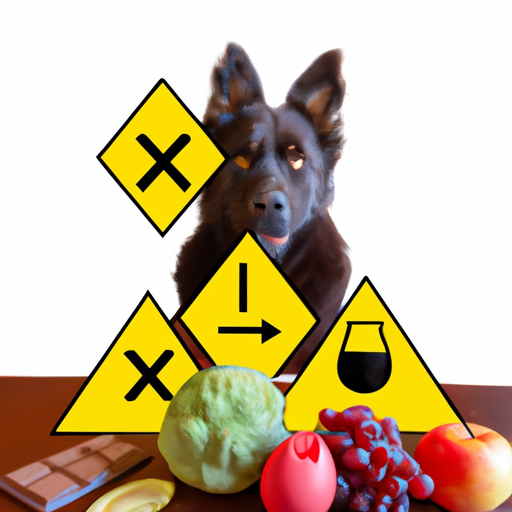As a caregiver, your top priority is often the well-being of those under your care, whether they’re human or canine. This guide will help you understand what foods are harmful to dogs, so you can keep your furry friend safe and healthy.
Introduction
It’s a common sight to see a dog begging for scraps at the dinner table. However, it’s crucial to remember that not all human foods are safe for dogs. Some foods we consume daily can be harmful, even fatal, to our four-legged friends.
1. Chocolate
Chocolate is one of the most well-known foods that dogs shouldn’t eat. It contains theobromine and caffeine, both of which can be toxic for dogs. Darker, purer varieties of chocolate contain higher levels of theobromine, making them more dangerous.
Symptoms of chocolate poisoning in dogs include:
- Rapid breathing
- Vomiting and diarrhea
- Increased heart rate
- Seizures
2. Grapes and Raisins
Grapes and their dried counterparts, raisins, can cause kidney failure in dogs. Even small amounts can make a dog ill. The exact substance that causes the toxic reaction is still not known.
Symptoms of grape or raisin toxicity include:
- Vomiting
- Diarrhea
- Abdominal pain
- Loss of appetite
3. Onions and Garlic
Onions, garlic, and other members of the Allium family can cause damage to a dog’s red blood cells, leading to anemia. This is true for all forms of these foods, whether they’re raw, cooked, or in powdered form.
Symptoms of Allium poisoning can include:
- Weakness
- Lethargy
- Pale gums
- Rapid breathing
4. Alcohol
Alcohol has the same effect on a dog’s liver and brain that it has on humans. But it takes far less to harm them. Even a small amount can cause vomiting, diarrhea, central nervous system depression, problems with coordination, difficulty breathing, coma, and even death.
5. Coffee and Caffeine
Caffeine in large enough quantities can be fatal for a dog. And, there is no antidote. Symptoms of caffeine poisoning include restlessness, rapid breathing, heart palpitations, muscle tremors, and fits.
| Food | Symptoms | Severity |
|---|---|---|
| Chocolate | Vomiting, Diarrhea, Rapid breathing, Seizures | High |
| Grapes/Raisins | Vomiting, Diarrhea, Abdominal pain, Loss of appetite | High |
| Onions/Garlic | Weakness, Lethargy, Pale gums, Rapid breathing | Medium |
| Alcohol | Vomiting, Diarrhea, Difficulty breathing, Coma | High |
| Coffee/Caffeine | Restlessness, Rapid breathing, Heart palpitations, Fits | High |
6. Xylitol
Xylitol is a sugar substitute found in many products, including candy, gum, baked goods, and toothpaste. It can lead to insulin release in most species, which can lead to liver failure. The increase in insulin leads to hypoglycemia (lowered sugar levels).
Symptoms of xylitol poisoning include:
- Vomiting
- Loss of coordination
- Lethargy
- Seizures
7. Dairy Products
While not immediately life-threatening, dairy products can cause digestive problems in dogs due to their lack of lactase, the enzyme that breaks down lactose. This can result in diarrhea and other forms of digestive upset.
8. Raw Meat and Fish
Certain kinds of raw meat and raw fish, like salmon and trout, can contain a parasite that causes fish disease. Some dogs can develop an allergic reaction or be infected by parasites present in raw meat.
FAQs
Q: What do I do if my dog consumes a dangerous food?
A: If your dog consumes a dangerous food, contact your vet immediately. If possible, note the amount of food consumed and any symptoms your dog is exhibiting.
Q: Can dogs eat any human foods safely?
A: Yes, many fruits and vegetables are safe for dogs. Always research or ask your vet before feeding your dog new foods.
Q: Are all dogs affected the same by dangerous foods?
A: No, just like humans, dogs can have individual sensitivities and allergies. Always monitor your dog when introducing new foods.
Q: Is it okay to feed my dog table scraps?
A: It’s generally not recommended, as many common foods contain ingredients harmful to dogs. It’s safer to stick to dog-approved treats and foods.
Remember, as a caregiver, your vigilance can make all the difference in your furry friend’s health. When in doubt, always consult a vet before introducing new foods into your dog’s diet.



